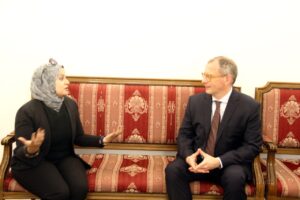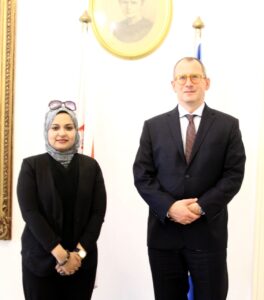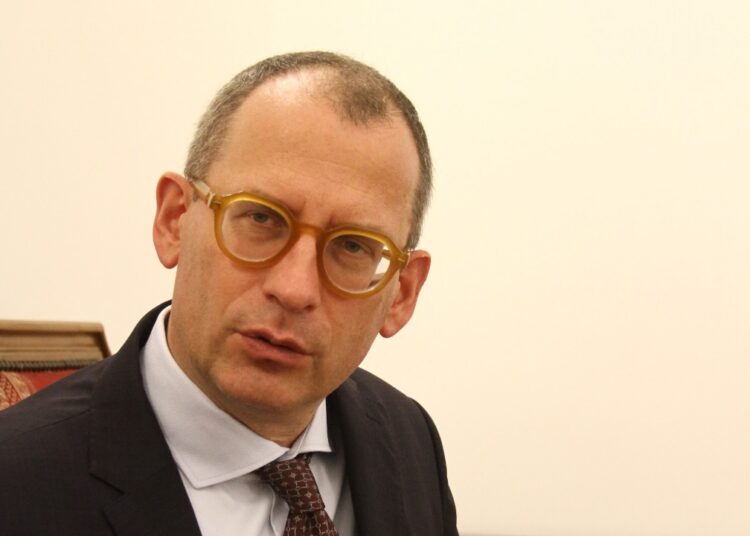Reopening of Avenue of Sphinxes
impressive,well directed
Poland, Czech Republic, Slovakia and Hungary make up the V4, a co-operation framework with long history and rich agenda. The V4+Egypt Summit in Budapest last October has become a regular opportunity to discuss issues of mutual interest with Egypt. High-level political dialogue with the participation of President Abdel Fattah El Sisi and Minister of Foreign Affairs Sameh Shoukri with V4 leaders is the best proof that all sides see their counterparts as crucial and trustworthy partners. Indeed, trust is a very strong currency in politics.
In an interview with the Egyptian Mail, Poland’s Ambassador to Egypt Michał Łabenda spoke about horizons for co-operation and recent developments along the Poland-Belarus border.

Poland-Belarus border
The polish ambassador said that between May and August 2021 over 10,000 migrants, mostly from Iraq, were brought to Poland’s border with Belarus.
“We closely work with our partners in the region, including Egypt, in order to deal with this phenomenon,” Łabenda said.
“Thanks to this co-operation, to our diplomatic efforts in Europe and Middle East along with our European partners, and to our firm stance on the ground, we were able to counter this threat.
“Poland is responsible for the EU’s external border and is obliged to protect it. We are tasked with preventing any attempts at illegal border crossing. Despite the tension, we control the situation and no action from our side will go against our international or humanitarian obligations,” Łabenda added.
The ambassador explained how this practice works. “Migrants are encouraged to buy ‘trips’ to Minsk. Then they arrive via Istanbul or Dubai, they are put up in state-owned hotels.
“Later, the security services move them to the border with Poland. On the way, they are often beaten, robbed, and made to pay bribes. Transport costs anything between $2,000 and $12,000.
“Those people are often unaware that their entry into the EU will be illegal. Even if they make it through the border, they will not get into Germany or France, but will remain in Poland until the procedures are complete.
“Then they will most probably be sent back home as they usually do not qualify for refugee status – most of them come from countries not affected by war.”

Promising economics
The ambassador said Egypt is one of Poland’s main trade partners in North Africa. “Trade exchange between our countries usually exceeds $500 million. Last year, due to economic slowdown following Covid-19, it amounted to $579.6 million while a year earlier it was $678.3 million. Polish exports reached $384.5 million (479.2 million in 2019), while imports were at $195.2 million (S199.2 million in 2019,” the envoy said.
Initial data for first nine months of the year suggest that the trade exchange is growing. Polish exports were worth $278 million, marking a 10 per cent increase, and imports were at more than $241 million, up 70 per cent.
The ambassador also referred to the MoU between the Suez Canal Economic Zone and the Katowice Special Economic Zone, saying that it has proved that Polish entrepreneurs are determined to expand and discover new markets. We believe that formal co-operation between the economic zones will generate interest of Polish investors in the area.
Unique tourist,archaeological co-operation
The ambassador attended the reopening of the Avenue of Sphinxes in Luxor, saying that the ceremony was “very impressive” and “well directed”.
“It took us back to the ancient feast where music and light have brought to life the stories written in hieroglyphs. The reopening of the Avenue of Sphinxes will certainly lead to an increase of tourism interests in this region,” he said.
“Despite pandemic, Egypt is one of Poland’s favourite holiday destinations. Last year due to travelling restrictions, 70,000 tourists from Poland visited Egypt. However, by September this year, the figure stands at about 180,000.
“We can expect that next year the number of visitors to Egypt from Poland will reach 350,000.”
Regarding archaeology, the very first Polish excavations in Egypt were conducted in the 1930s by a pioneer of Polish archeology in Egypt – Professor Kazimierz Michałowski. In 1959, he founded the Polish Centre of Mediterranean Archeology in Cairo (PCMA) as part of the University of Warsaw.
“As a result of friendly co-operation between the Ministry of Tourism and Antiquities of Egypt, PCMA, and the Embassy of the Republic of Poland in Cairo, in 2019, the 60th anniversary of the PCMA Research Centre in Cairo was marked with the exhibition in the Egyptian Museum.
“For more than 60 years, the Polish Centre has been involved in research in over 25 sites from different periods. To date, our archaeologists have been making spectacular discoveries and only this year in Deir el-Bahari they found votive offerings to Hathor, including figurines, amulets and ceramic vessels.”
Amongst the most popular Polish-Egyptian missions in Egypt is the Marea Archaeological Project with a recent spectacular discovery of a 6th century BC portion of the city.
The PCMA UW also helps to coordinate projects of other Polish science institutions working in Tell el-Retaba, Tell el-Farkha, Tell el-Murra and Gebel Ramlah.
“Besides all the outstanding Polish-Egyptian projects, PCMA Research Centre offers scholarships in research related to the archaeology and history of Egypt. “The best proof of the unique spirit of co-operation between Poland and Egypt is the Medal of Merit, awarded by the President of the Republic of Poland in 2020 to Khaled al-Anani and to Dr Zahy Hawass. In this way, Poland wanted to reward the Egyptian authorities with whom we enjoy excellent co-operation.”

Cultural ties
The Polish Embassy supports the development of cultural relations.
“First of all, we are interested in promoting Polish culture to the fullest extent and familiarising Egyptians with it as we are convinced that the thousand-year cultural heritage of our country has a lot to offer,” the ambassador said.
The embassy organises various types of cultural events addressed to Egyptians, including film screenings, events and music concerts, notably the Fryderyk Chopin piano competition for Egyptian children and youth.
“We would like to pay particular attention to the project of the Polish Book Institute called the ‘School of New Translators’. This year’s edition of the project was addressed to Arabic-speaking countries and we are pleased to announce that in shortlist for the finalists was an Egyptian, Alaa Mamdouh, a graduate in Polish language from Ain Shams University,” he added.
At the educational level, the embassy has a number of exchange programmes for students and scientists.
“Our Polish National Agency for Academic Exchange (NAWA) has bilateral agreements and co-operation with many countries, including Egypt.”
The objective of NAWA programme is to increase the level of internationalisation of Polish higher education.
“On December 16, the NAWA will be hosting a virtual educational fair. On that day, 40 leading Polish universities will present their educational programmes.”






Discussion about this post